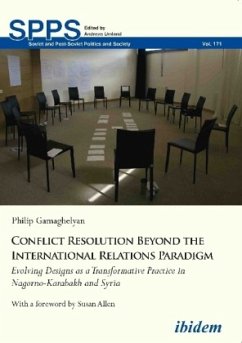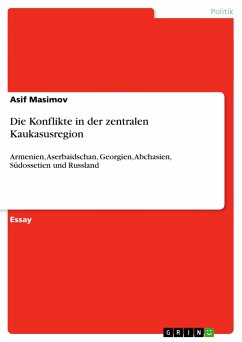Conflict Resolution holds the promise of freeing approaches and policies with regard to politics of identity from the fatalistic grip of realism. While the conceptual literature on identity and conflicts has moved in this alternative direction, conflict resolution practice continues to rely on realist frames and acts as an unwanted auxiliary to traditional International Relations (IR). Perpetuation of conflict discourses, marginalization, and exclusion of affected populations are widespread. They are caused by the over-reliance of conflict resolution practice on the binary frames of classic IR paradigms and also by the competitive and hierarchical relationships within the field itself. Philip Gamaghelyan relies on participatory action research (PAR) and collective auto-ethnography to expose patterns of exclusion and marginalization as well as the paradoxical reproduction of conflict-promoting frames in current conflict-resolution practice applied to the Nagorno-Karabakh and Syrian crises. He builds on the work of post-modernist scholars, on reflective practice, and on discourse analysis to explore alternative and inclusive strategies with a transformative potential through reflections and actions customary for PAR. The IR discipline, that has dominated policy-making, is only one possible lens, and often a deficient one, for defining, preventing, or resolving contemporary conflicts wrapped in identity politics. Other conceptual frameworks can help to rethink our understanding of identity and conflicts and reconstruct them as performative and not static phenomena. These transformative frameworks are increasingly influential in the conflict resolution field and can be applied to policy-making.
Philip Gamaghelyan is an experienced scholar-practitioner whose authentic quest to transform international conflicts has resulted in discoveries that ought to occasion a fundamental paradigm shift in the field of conflict resolution. Gamaghelyan exposes and thoroughly documents how the field of international conflict resolution unwittingly perpetuates and reifies conflicts, rather than transforming them, as a consequence of the near-universal conceptual and/or practical assumption of conflict 'sides'. The very presumption that conflicts are characterized by 'sides' generates and maintains polarized and rigid oppositions while marginalizing any voices and constituencies that do not fit this oppositional framing. The author then documents how standard practices of international conflict resolution unintentionally create counter-productive marginalization across a range of additional dimensions, as well as how an emerging 'business' of conflict resolution profits from the maintenance of conflict. Through the sensitively and humbly narrated story of his own individual and collective learning through real-life cases of international conflict transformation processes, Gamaghelyan also provides insights and guidance for stepping into a new paradigm of international conflict transformation that, when authentically and self-critically engaged, creates new capabilities for genuinely resolving entrenched conflict. Dr. Jessica Srikantia, Rhodes Scholar and an Associate Professor at George Mason University's Schar School of Policy and Government.








